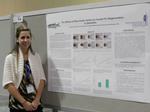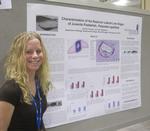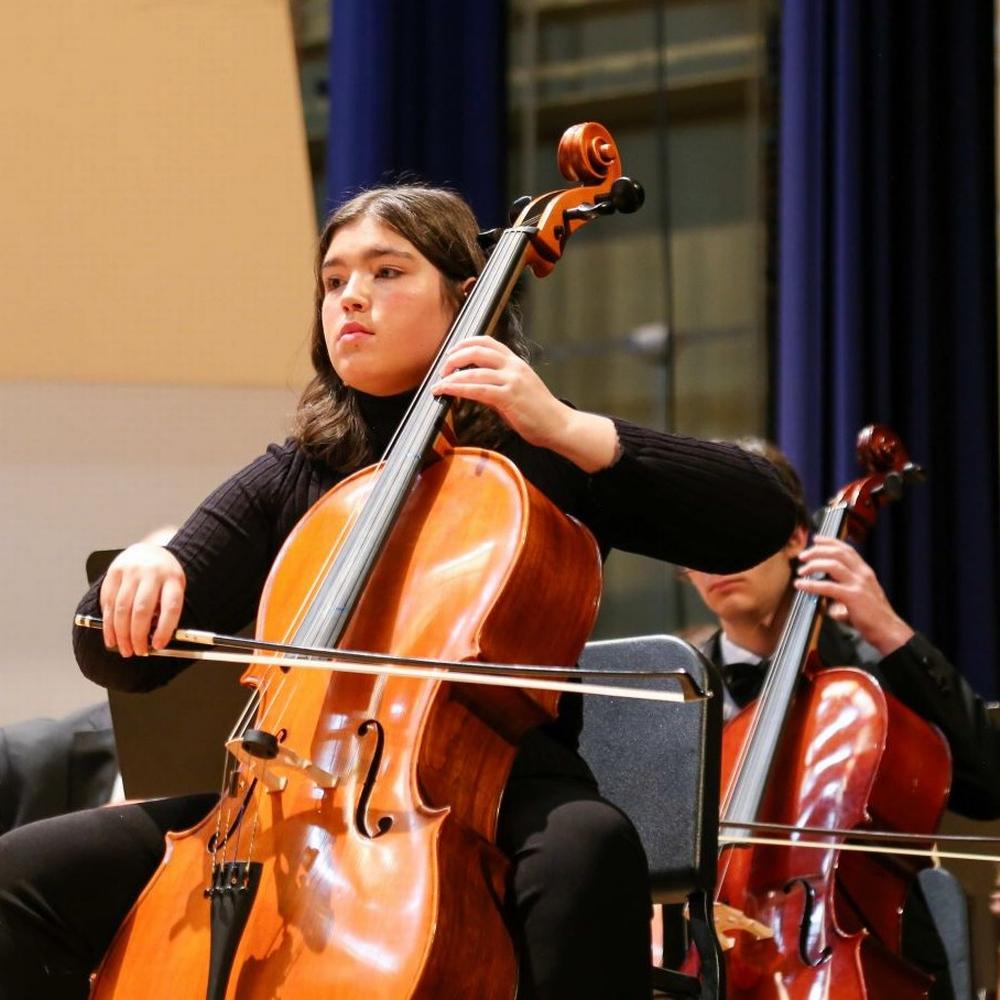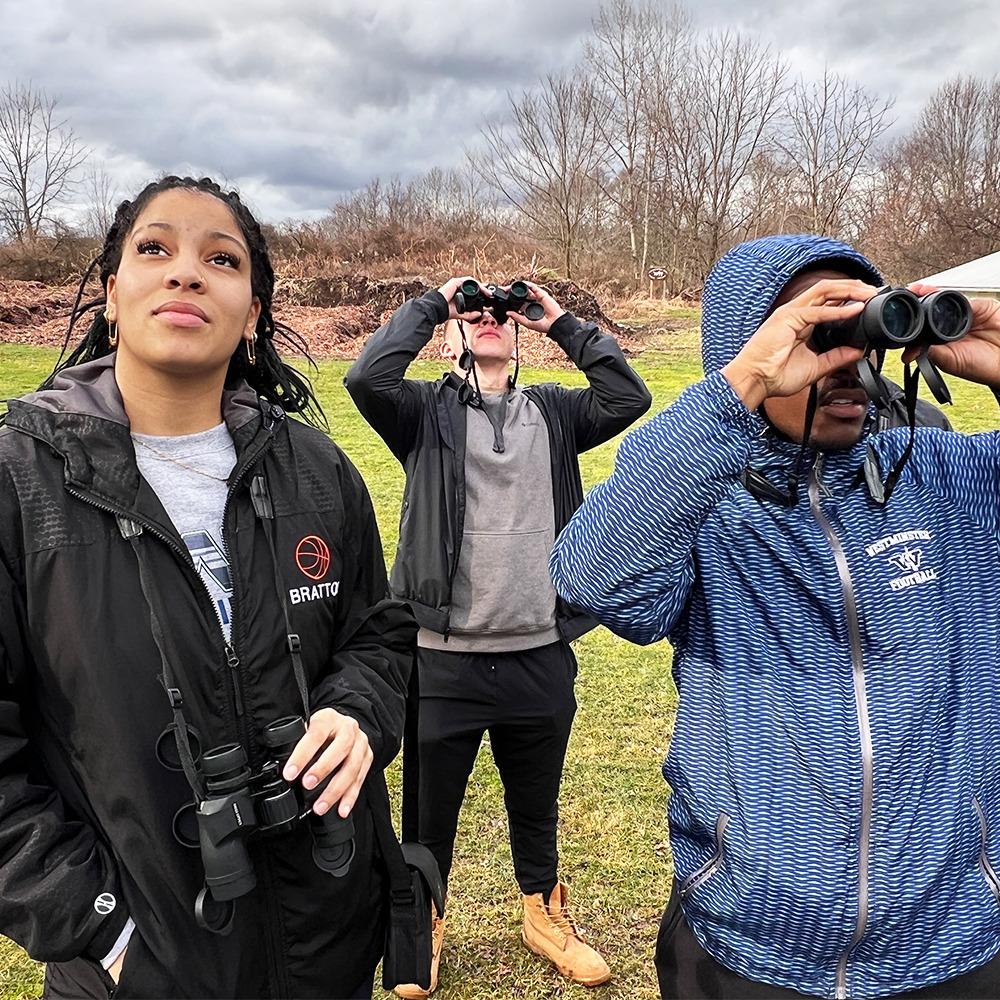Senior Biology Majors Received Drinko Grants to Present Research
Posted on Tuesday, January 31, 2012
Four Westminster College senior biology majors presented their capstone research at the annual meeting of the Society for Integrative and Comparative Biology (SICB) Jan. 3-7 in Charleston, S.C.
Hayley Ebersbacher, Kaitlyn Kemer, Jennifer Krueger, and Kristen Prezioso were awarded travel/presentation grants from Westminster's Drinko Center for Excellence in Teaching and Learning. In addition, all four received Charlotte Magnum awards from SICB to cover the costs of registration.
The students were accompanied by their faculty advisers: Dr. Marosh Furimsky, assistant professor, and Dr. John Robertson, associate professor.
Ebersbacher's research, "The Effects of Deer Antler Velvet on Caudal Fin Regeneration in Zebrafish," was advised by Furimsky.
Deer antler velvet can be harvested while the antler is regenerative and is thought to contain substances that would positively contribute to aspects of human health. The research showed no effect of the velvet on caudal fin regeneration rate, although it did seem to cause a morphological difference in the growth pattern of some of the regenerating fins.
"This meeting was a very valuable experience," Ebersbacher said. "It was exciting to present my research for a group of people who were really interested in what I was doing and who were able to make suggestions as to how I could improve the study. It was also interesting to attend the speaker and poster sessions to learn about what others are researching in this field."
Ebersbacher is a daughter of Mark and Linda Ebersbacher of Chesterland, Ohio, and a graduate of West Geauga High School.
Kemer's project, "Visual System Development in the Paddlefish (Polyodon spathula)," was advised by Furimsky.
Paddlefish are one of the largest freshwater fish in the U.S. Two distinguishing characteristics are an elongated snout (rostrum) and fully-developed, but weak, eyesight that are used for prey detection and predator avoidance. Previous studies have shown that the visual system may be redundant. The eyes were removed and the paddlefish was still able to find its prey easily and maneuver through its environment. The goal of this study was to describe the developmental process and anatomic structure of the paddlefish eye through a histological approach.
"This was the largest SICB meeting and had a variety of interesting projects and ideas to be heard," Kemer said. "We learned more about a wide range of topics and possible ideas for future experiments."
Kemer is a daughter of Kevin and Debra Kemer of Medina, Ohio, and a graduate of Medina High School.
Krueger presented "Characterization of the Rostrum Lateral Line Organ of the Juvenile Paddlefish, Polyodon spathula." The research was conducted under Robertson's supervision.
Krueger took measurements of a sensory organ in the paddlefish rostrum (paddle-shaped snout) to provide a baseline description of the sensory structure. The description promotes understanding of the functional anatomy and sensory biology of the paddlefish, which may be useful in ongoing efforts to conserve the paddlefish; in comparative studies of the lateral line systems in other species; and as a model for studies of the development of sensory systems, as the rostrum develops after birth.
"The conference provided a great opportunity to present my research to a diverse audience and to meet many new people," Krueger said. "It provided a more in-depth perspective of the research areas and specialties in biology."
Krueger is a daughter of Candi Braswell of Adamsville and a graduate of Conneaut Lake High School.
Prezioso's research, "Neuronal and Behavioral Effects of Parkinsonism-Inducing Neurotoxin, 1-methyl-4-phenyl-1,2,3,6-tetrahydropyridine (MPTP) on Zebrafish Larvae (Danio rerio)," was supervised by Furimsky.
MPTP is a synthetic heroin found to cause Parkinson's disease-like symptoms in injected humans and animals. Prezioso's project studied the behavioral and neuronal effects of toxin exposure on the swimming velocity and response to tactile stimulation of zebrafish. Since MPTP is linked to pesticides and herbicides, studies of the toxin provide insight on whether Parkinson's disease onset could be due to environmental factors.
"Undergraduate research conferences are a great way to expand your horizons," Prezioso said. "Not only was I able to strengthen my presentation skills by sharing the work I've done in a larger setting, but I also increased my knowledge by learning new things from people with similar interests. This experience was truly a memorable one."
Prezioso is a daughter of Gene and Rosemary Prezioso of Sharpsville and a graduate of Sharpsville High School.
Contact Furimsky at (724) 946-7207 (email) or Robertson at (724) 946-7044 (email) for additional information on the research.
The Drinko Center for Excellence in Teaching and Learning was created to enrich undergraduate education at Westminster through advancing world-class teaching as well as by participating in collaborations that address community and regional needs including strengthening K-12 education. The Undergraduate Research Initiative provides funding for students to conduct research and to present their research at regional and national conferences. Visit the Drinko website for more information about the Drinko Center and its programs.
More Stories







